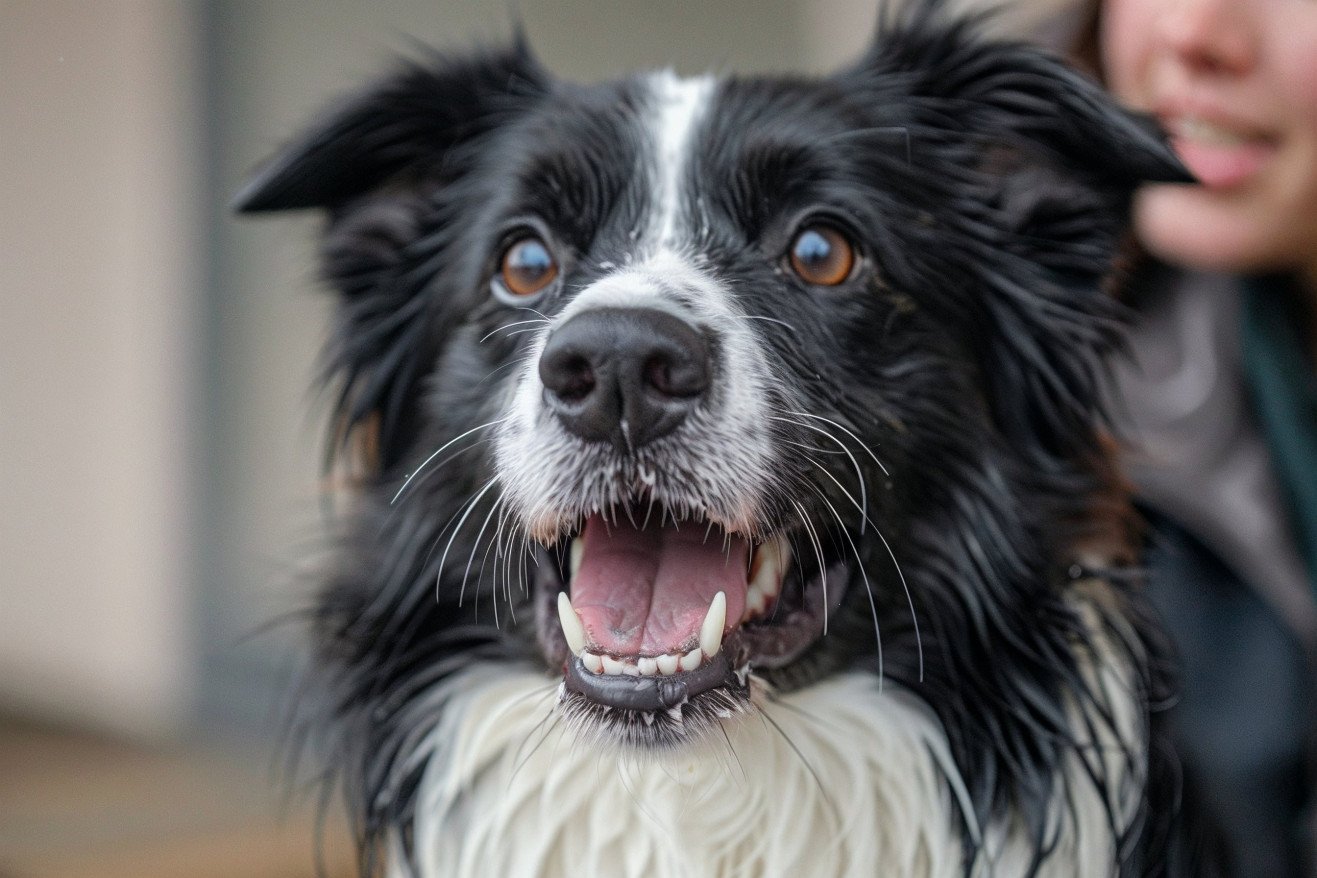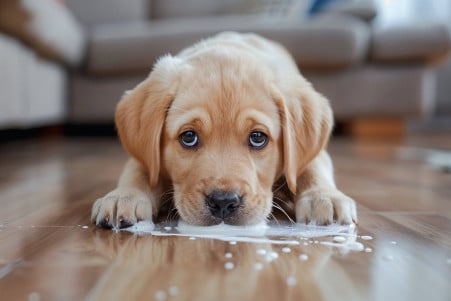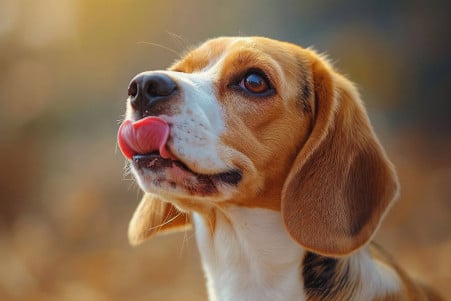Why Is My Dog Foaming at the Mouth? Potential Causes and Responses
20 March 2024 • Updated 20 March 2024

Foaming at the mouth is a worrisome sign in dogs and often indicates an underlying health problem that needs to be addressed immediately. There are many reasons why a dog may be drooling and foaming at the mouth, including nausea, oral or dental problems, heatstroke, poisoning, seizures, rabies, and complications from labor. Other symptoms, such as vomiting, lethargy, and difficulty swallowing, may also be present depending on the cause.
To help you better understand this issue and any potential problems it may indicate, we've referenced veterinary professionals and studies to learn more.
This article covers the many causes of this issue, detailing the symptoms that may come with each one and offering information on how to treat or prevent the problem to help your dog stay healthy.
By the time you're done, you'll know when to take your dog to the vet because of their foaming at the mouth and how to help them through it.
Is my dog foaming at the mouth due to a serious condition?
When to Seek Emergency Veterinary Care
Foaming at the mouth in dogs can be a sign of many different things, some of which may require immediate medical attention. If you suspect poisoning or that your dog has ingested a toxic substance, it is important to act quickly. According to PetHelpful, you should get to the vet immediately and not induce vomiting unless directed by a vet. If the foaming continues or gets worse, even if there are no other symptoms, you should take your dog to the vet.
Outward Hound explains that if your dog is having a seizure, they may drool and foam at the mouth. They may also exhibit other abnormal behaviors like aggression. This is a medical emergency. Although it is rare due to the rabies vaccine, rabies can cause foaming at the mouth and difficulty swallowing, as mentioned by the same source.
If your dog is foaming at the mouth and also vomiting, is lethargic, has a loss of appetite, or is showing other symptoms that you are concerned about, it could be a sign of a medical emergency, according to Knose. Seizures that last longer than 5 minutes are life-threatening and you should take your dog to the vet immediately, according to the same source. Knowing these symptoms can help you make sure that your dog gets the care they need as soon as possible, potentially saving their life when they are foaming at the mouth.
First Aid and Stabilization Steps for Foaming at the Mouth
If your dog is foaming at the mouth, it's important to stay calm and make sure your dog is safe. PetCube recommends moving your dog away from anything that could be dangerous, such as toxic substances, sharp items, or traffic. Call your vet or an emergency animal hospital immediately and be prepared to tell them about your dog's symptoms and any potential causes.
While you're waiting for professional help, make sure to keep an eye on your dog, but don't try to do anything like treat them yourself or make them throw up unless you're told to do so by a professional, according to WagWalking. If the foaming is due to heat exhaustion or overexertion, make sure to keep your dog hydrated and cool, according to the Emergency Animal Care Braselton clinic.
Make sure to do whatever your vet tells you to do to stabilize your dog's condition before you bring them in. It's important to get your dog to the vet as soon as possible so that they can determine what's causing the foaming and treat it. There are many different things that could be causing the foaming, and they range in severity from minor to life-threatening.
Other Things That Can Cause Foaming at the Mouth
While foaming at the mouth can be a sign of a serious medical condition, there are also a number of relatively harmless reasons why it might happen. According to Hill's Pet, excessive panting and drooling, especially after exercise or in hot weather, can cause the saliva to become aerated and lead to a foamy, bubbly appearance. Meanwhile, Canidae says that heavy panting when a dog is trying to cool down after play or exercise is one of the first signs of heat exhaustion.
Stress, anxiety, or excitement can also cause excessive drooling and foaming in some dogs, according to Canidae. In addition, teething puppies or dogs with dental problems may foam at the mouth because they are producing more saliva, says Hill's Pet. Some medications or bad-tasting substances can also cause foaming, as noted in the same article.
While these other causes of foaming may be worrisome, they are not typically medical emergencies. That said, if the foaming continues or is accompanied by other symptoms like vomiting or a change in appetite, it could be a sign of a more serious issue that requires immediate medical attention.
Foaming at the Mouth with Vomiting or Lack of Appetite
Foaming at the mouth in combination with vomiting, especially if the vomit is white or foamy, can be a sign of a number of gastrointestinal conditions or other health issues, says The Spruce Pets. If your dog is foaming at the mouth and not eating, it could be due to nausea, stomach upset, or a more serious issue like pancreatitis or an intestinal blockage, explains the same source.
If your dog is vomiting repeatedly or has no appetite and is foaming at the mouth, it’s important to take them to the vet right away to determine the cause and get them the necessary treatment, says the Ollie Blog. The treatment and diagnostic tests that will be recommended will depend on the cause, but may include medication, dietary changes, or more invasive procedures, according to JustAnswer.
The vet may also recommend fluid therapy, injectable antiemetic medications, and additional diagnostics such as x-rays to determine the cause, explains the same source. By taking your dog to the vet as soon as possible if they’re foaming at the mouth and vomiting or not eating, you can make sure they get the care and treatment they need to address any gastrointestinal or other health issues that may be causing their symptoms.
How to Avoid Foaming at the Mouth
To avoid foaming at the mouth in dogs, make sure your dog is current on their rabies vaccine and try to limit their contact with wildlife, according to PetHelpful. In addition, Canidae explains that keeping up with good dental care, including regular teeth brushing, dental chews, and professional cleanings, can help prevent dental problems that may lead to excessive drooling.
In addition to these measures, it's important to keep a calm environment for your dog and try to identify and avoid potential stressors and triggers that may lead to stress-induced foaming at the mouth, according to the same source. Meanwhile, make sure your dog stays cool and well-hydrated, and avoid letting them overexert themselves, especially in hot weather, to prevent heat-induced foaming, according to PawSafe.
Finally, make sure to keep your home free of any potential poisons or toxins to prevent accidental poisoning, which is a common cause of foaming at the mouth in dogs, according to PetHelpful. By following these tips, you can help keep your dog safe and healthy and avoid any scary instances of foaming at the mouth.
Conclusion: Be Aware and Get Professional Help
Foaming at the mouth in dogs is a worrisome symptom that can indicate a number of health problems, some of which are serious. The causes of excessive drooling and foaming can range from relatively minor issues like nausea and dental problems to more severe concerns like heatstroke, poisoning, and seizures. Other symptoms can help you determine the cause of the foaming, such as vomiting, lethargy, and difficulty swallowing.
If your dog is foaming at the mouth and is also experiencing seizures, disorientation, or you suspect poisoning, it is important to seek veterinary care immediately. In these cases, time is of the essence, and these symptoms can be considered medical emergencies. In other cases, the cause of the foaming may be less serious, such as stress, excitement, or dental issues. However, if the foaming persists or is accompanied by other symptoms like vomiting or a lack of appetite, you should take your dog to the vet.
To prevent foaming at the mouth, make sure your dog is up-to-date on their rabies vaccine, practice good dental care, and make sure your dog is in a stress-free environment. By being aware and seeking professional help when necessary, you can make sure your dog is healthy and get them the care they need.


